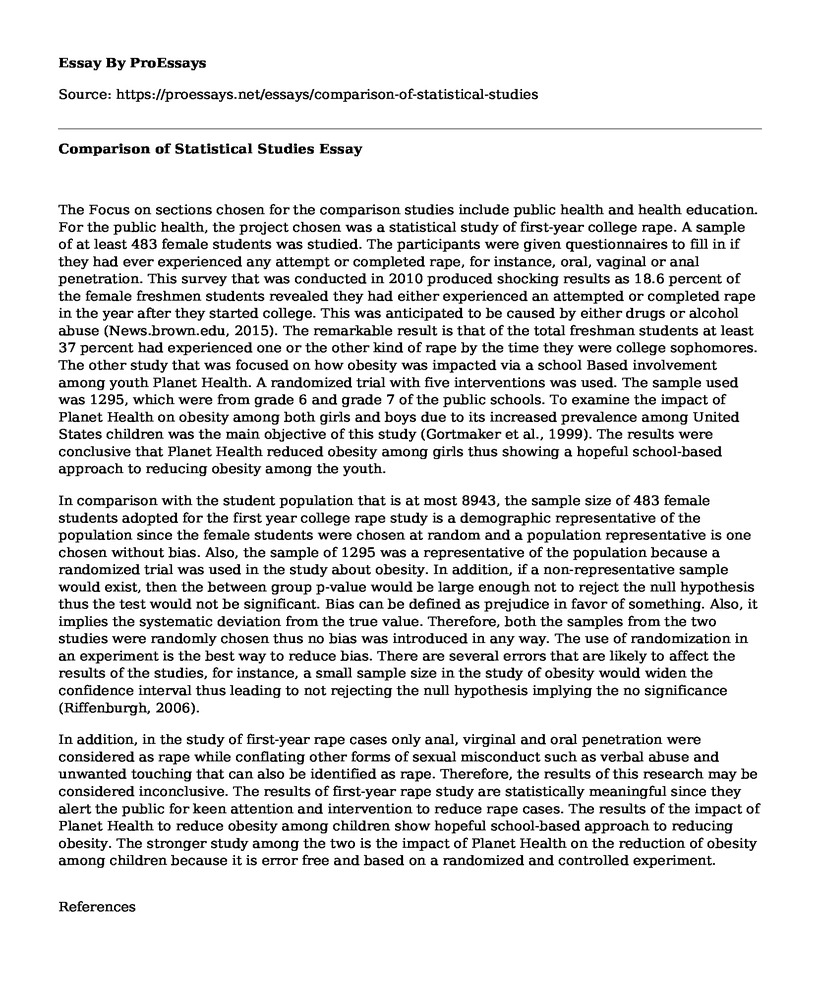The Focus on sections chosen for the comparison studies include public health and health education. For the public health, the project chosen was a statistical study of first-year college rape. A sample of at least 483 female students was studied. The participants were given questionnaires to fill in if they had ever experienced any attempt or completed rape, for instance, oral, vaginal or anal penetration. This survey that was conducted in 2010 produced shocking results as 18.6 percent of the female freshmen students revealed they had either experienced an attempted or completed rape in the year after they started college. This was anticipated to be caused by either drugs or alcohol abuse (News.brown.edu, 2015). The remarkable result is that of the total freshman students at least 37 percent had experienced one or the other kind of rape by the time they were college sophomores. The other study that was focused on how obesity was impacted via a school Based involvement among youth Planet Health. A randomized trial with five interventions was used. The sample used was 1295, which were from grade 6 and grade 7 of the public schools. To examine the impact of Planet Health on obesity among both girls and boys due to its increased prevalence among United States children was the main objective of this study (Gortmaker et al., 1999). The results were conclusive that Planet Health reduced obesity among girls thus showing a hopeful school-based approach to reducing obesity among the youth.
In comparison with the student population that is at most 8943, the sample size of 483 female students adopted for the first year college rape study is a demographic representative of the population since the female students were chosen at random and a population representative is one chosen without bias. Also, the sample of 1295 was a representative of the population because a randomized trial was used in the study about obesity. In addition, if a non-representative sample would exist, then the between group p-value would be large enough not to reject the null hypothesis thus the test would not be significant. Bias can be defined as prejudice in favor of something. Also, it implies the systematic deviation from the true value. Therefore, both the samples from the two studies were randomly chosen thus no bias was introduced in any way. The use of randomization in an experiment is the best way to reduce bias. There are several errors that are likely to affect the results of the studies, for instance, a small sample size in the study of obesity would widen the confidence interval thus leading to not rejecting the null hypothesis implying the no significance (Riffenburgh, 2006).
In addition, in the study of first-year rape cases only anal, virginal and oral penetration were considered as rape while conflating other forms of sexual misconduct such as verbal abuse and unwanted touching that can also be identified as rape. Therefore, the results of this research may be considered inconclusive. The results of first-year rape study are statistically meaningful since they alert the public for keen attention and intervention to reduce rape cases. The results of the impact of Planet Health to reduce obesity among children show hopeful school-based approach to reducing obesity. The stronger study among the two is the impact of Planet Health on the reduction of obesity among children because it is error free and based on a randomized and controlled experiment.
References
Gortmaker, S., Peterson, K., Wiecha, J., Sobol, A., Dixit, S., Fox, M., & Laird, N. (1999). Reducing Obesity via a School-Based Interdisciplinary Intervention Among Youth. Arch Pediatr Adolesc Med, 153(4), 409. http://dx.doi.org/10.1001/archpedi.153.4.409
News.brown.edu,. (2015). A statistical study of first-year college rape | News from Brown. Retrieved 10 December 2015, from https://news.brown.edu/articles/2015/05/rape
Riffenburgh, R. (2006). Statistics in medicine. Amsterdam: Elsevier Academic Press.
Cite this page
Comparison of Statistical Studies. (2021, Mar 25). Retrieved from https://proessays.net/essays/comparison-of-statistical-studies
If you are the original author of this essay and no longer wish to have it published on the ProEssays website, please click below to request its removal:
- Poverty is Capability of Deprivation
- Colleges Should Not Experience Football Ban Essay
- Genetic Technologies for Effective Care Essay
- Essay on Nurse Practitioners Need Cultural Awareness Training to Provide Quality Care
- Paper Example on the Impact of CSAP Scores on Student Achievement: A Study of Scalar Variables
- Parents Satisfied With HPV Vaccination Program: Ready to Vaccinate Children - Essay Sample
- The Conceptual Foundations of My Holistic Nursing Practice - Report Sample







